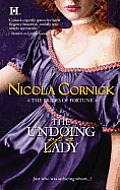
In my recent reading, I've noticed several elements that keep popping up. Almost every romance novel I've read in the past couple of weeks has featured one or more of the following plot devices: the long-parted and unexpectedly reunited lovers, a relationship between an older woman and a younger man (which plot device I would like to see a lot more of, thank you very much), and, alas, the Secret Baby.
The Confessions of a Duchess somehow managed to include all three without making me want to scream in frustration.
Confessions is the first in the Brides of Fortune trilogy, followed by The Scandals of an Innocent and The Undoing of a Lady. The trilogy is set in the village of Fortune's Folly, where Sir Montague Fortune has re-instated the ancient Dames' Tax, which requires any unmarried woman living in Fortune's Folly to turn over half her wealth to Sir Monty if she's not married within a twelvemonth. Of course, this brings any number of fortune-hunters to Fortune's Folly in pursuit of rich heiresses.
 Dexter Anstruther is in Fortune's Folly not to bag an heiress, though that would be nice, but to catch a murderer. Of course, immediately upon arrival he runs into Laura, the dowager duchess of Cole and his one-time lover. Dexter has always carried a torch for Laura, but Laura's marriage was unpleasant, to say the least, so she has a hard time letting Dexter in to her heart. Plus, Dexter's several years younger than she is, so she thinks getting involved would be unfair to him. And — oh, yeah — their brief affair several years ago resulted in a child (the aforementioned Secret Baby). Plus, there's the small fact that Laura used to be one of "Glory's Girls," a group of female bandits who had terrorized the countryside years earlier, and Dexter works for the Home Office (which apparently employed every unmarried male in Britain at one time), so he'll be honor-bound to arrest her should he ever find out. Naturally, Dexter finds out about both his daughter and Laura's notorious past and loves her anyway.
Dexter Anstruther is in Fortune's Folly not to bag an heiress, though that would be nice, but to catch a murderer. Of course, immediately upon arrival he runs into Laura, the dowager duchess of Cole and his one-time lover. Dexter has always carried a torch for Laura, but Laura's marriage was unpleasant, to say the least, so she has a hard time letting Dexter in to her heart. Plus, Dexter's several years younger than she is, so she thinks getting involved would be unfair to him. And — oh, yeah — their brief affair several years ago resulted in a child (the aforementioned Secret Baby). Plus, there's the small fact that Laura used to be one of "Glory's Girls," a group of female bandits who had terrorized the countryside years earlier, and Dexter works for the Home Office (which apparently employed every unmarried male in Britain at one time), so he'll be honor-bound to arrest her should he ever find out. Naturally, Dexter finds out about both his daughter and Laura's notorious past and loves her anyway.
What set this book apart for me was the fact that neither Laura nor Dexter was wealthy. Laura's the dowager duchess of Cole, but she hasn't any money and Dexter only has his salary from working for the Home Office. So often in historical novels at least one of the main characters is richer than Croesus and there is at least one scene of profligate spending on gowns and jewels and lacy undergarments and there's never any worry that the hero and heroine will be fine financially. With Dexter and Laura, though, there's always the possibility that the lack of fortune may, indeed, keep them apart. Being without a family fortune myself, it's refreshing to read a story in which I can identify more closely with the heroine.